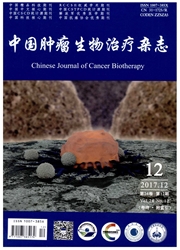

 中文摘要:
中文摘要:
目的:研究^131I标记CD133单链抗体(single chain rariable fragment, ScFv)在体外对人肝癌CD133+ HepG2干细胞的抑制作用。方法:免疫磁珠分选HepG2细胞,流式细胞术检测分选前后HepG2细胞的CD133表达率,克隆形成实验及体内成瘤实验验证CD133+ HepG2细胞的“干性”。氯胺T法^131I标记CD133 ScFv并测定标记率、比活度、放射性浓度。将分选出的CD133+ HepG2细胞分为^131I-CD133抗体治疗组、^131I治疗组、CD133抗体治疗组和^131I+CD133抗体治疗组,MTT法检测各组中对CD133+ HepG2细胞生长抑制的最适剂量和不同药物在12、48、72 h三个时间点对CD133+HepG2干细胞的生长抑制作用,流式细胞术检测各组细胞周期的变化。结果:分选的HepG2细胞的CD133表达率显著高于未分选细胞[(97.71±1.13)% vs(1.52±0.78)%,t=1.13、P=0.000]。CD133+ HepG2细胞相对于CD133- HepG2细胞具有更强的体外成球、克隆形成能力[(45.03±1.35)% vs (7.4±0.54)% ;t=3.92,P=0.000]和体内成瘤能力。131I-CD133 ScFv的标记率为88.92%,放射化学纯度为98.63%。当131I为3.7 MBq/100 μl、CD133抗体为1 μg/100 μl时,对CD133+ HepG2细胞的抑制率最高,达(89.58±0.74)%;在此剂量下131I-CD133 ScFv治疗组对CD133+ HepG2细胞生长抑制率显著高于其余各实验组,且呈时间依赖性。 ^131I-CD133 ScFv治疗组G0/G1期细胞比例为(27.50±1.12)%,较其余各组均明显减少(P〈0.05)。结论:成功制备的^131I-CD133 ScFv在体外能有效抑制人肝癌CD133+ HepG2干细胞的生长。
 英文摘要:
英文摘要:
Objective:To study the inhibitory effect of the anti-CD133 single chain variable fragment (ScFv) labeled with 131I on CD133+cancer stem cells (CSCs) sorted form human hepatocellular liver carcinoma HepG2 cells in vitro . Methods: CD133+ and CD133- CSCs were isolated from HepG2 cells through magnetic-activated cell sorting (MACS). CD133 expression in both sorted and unsorted cells was analyzed by flow cytometry (FCM). The property of CD133+ CSCs was validated by sphere-forming assay and colony formation assay in vitro and tumor formation assay in nude BALB/c mice in vivo . The monoclonal antibody CD133 was labeled with 131I using the chloramines T method and the labeling rate, specific activity and radioactivity were evaluated. CD133+ CSCs were treated with 131I, CD133 ScFv, 131I-CD133 ScFv, and 131I+CD133 ScFv. At 12, 24 and 48 hours after treatment, cell proliferation and cell cycle progression were assessed by MTT assay and FCM respectively. Results: CD133 was detected in (97.71±1.13)% of the sorted CD133+ HepG2 cells but in only (1.52±0.78)% of unsorted HepG2 cells ( P =0.0001). As compared with CD133- HepG2 cells, CD133+ HepG2 cells showed a higher tumor sphere formation ability ([45.03±1.35]% vs [7.4±054]%, P 〈0.001). The 131I labeling rate of CD133 ScFv was 88.92%, and the radiochemical-purity was 98.63%. A maximal CD133+ cell growth inhibition of (89.58±0.74)% was observed ( P 〈0.05) when 131I was used at 3.7 MBq/100 μl and CD133 ScFv was used at 1 μg/100 μl, significantly higher than other doses ( P 〈0.05). The proportion of G0/G1 phase arrest in cells treated with 131I-CD133 ScFv was significantly reduced as compared with treatments ( P 〈0.05). Conclusion: Radioisotope 131I labeled CD133 ScFv may effectively inhibit growth of CD133-positive human hepatocellular carcinoma cells in vitro .
 同期刊论文项目
同期刊论文项目
 同项目期刊论文
同项目期刊论文
 Chromatin immunoprecipitation-sequencing predicts p300 binding sites in the MCF7 human breast cancer
Chromatin immunoprecipitation-sequencing predicts p300 binding sites in the MCF7 human breast cancer CD133 silencing inhibits stemness properties and enhances hemoradiosensitivity in CD133-positive liv
CD133 silencing inhibits stemness properties and enhances hemoradiosensitivity in CD133-positive liv Identification of biomarkers for hepatocellular carcinoma using network-based bioinformatics methods
Identification of biomarkers for hepatocellular carcinoma using network-based bioinformatics methods TRANSCATHETER ARTERIAL CHEMOEMBOLIZATION IN COMBINATION WITH HIGH-INTENSITY FOCUSED ULTRASOUND FOR U
TRANSCATHETER ARTERIAL CHEMOEMBOLIZATION IN COMBINATION WITH HIGH-INTENSITY FOCUSED ULTRASOUND FOR U Radioimmunoimaging with Mixed Monoclonal Antibodies of Nude Mice Bearing Human Lung Adenocarcinoma X
Radioimmunoimaging with Mixed Monoclonal Antibodies of Nude Mice Bearing Human Lung Adenocarcinoma X 期刊信息
期刊信息
